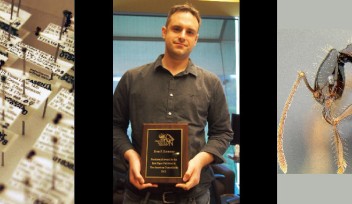What's in a Name

The friendship between OIST and the University of the Ryukyus just got a little boost. In a recent paper published in the academic journal ZooKeys, Professor Evan Economo of the OIST Biodiversity and Biocomplexity Unit described a new ant species and named it ‘Pristomyrmex tsujii’ after University of Ryukyus Professor Kazuki Tsuji. Pristomyrmex tsujii is a beautiful but rare species, endemic to the South Pacific archipelago of Fiji, and is threatened by the effects of climate change and deforestation.
Prof. Tsuji is a leading ecologist well known for his work on the ant species Pristomyrmex punctatus, a species native to Japan. Also an executive of the Ecological Society of Japan and member of the prestigious Science Council of Japan, Prof. Tsuji is very keen on promoting international collaboration in his fields of Ecology, Evolutionary Biology, and Entomology. Prof. Tsuji reached out to OIST faculty who have come from overseas and invited them to symposia and conferences, thus acting as the liaison for integrating OIST faculty into the Japanese scientific community.
“I wanted to honor his contribution to the field and fascinating work on Pristomyrmex punctatus. I also personally felt indebted to Prof. Tsuji for making foreign researchers like myself feel welcome in Japanese science,” said Prof. Economo.
Prof. Tsuji gained acclaim for his study on the phenomenon called “social cancer” in Pristomyrmex punctatus. This ant is quite common around Okinawa and can be found in various parts of the OIST campus. Unlike most other species of ants, Pristomyrmex punctatus lacks a queen, which bears all the offspring in a “normal” ant colony. Instead, all the worker ants have reproductive abilities, which raise potential for conflict. The workers are divided into two strains, altruists and cheaters – the former work hard for the common good but the latter do not pull their weight. By avoiding work, cheaters are generally able to produce more offspring with their extra energy. Cheaters, however, produce more cheaters. When there are too many, the colony work does not get done and eventually leads to colony collapse. This is analogous to how “selfish” cancer cells multiply uncontrollably and kill the host, which is why Prof. Tsuji calls the cheaters a “social cancer”.
With regards to having a species named after him, Prof. Tsuji commented, “I feel honored to have a new Pristomyrmex species named after me. I hope that the research endeavors of our two Okinawan universities will lead to stronger ties between Okinawa and the Pacific Islands.”
Research Unit
For press enquiries:
Press Inquiry Form

















